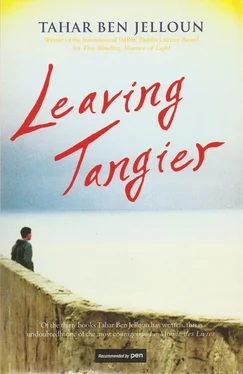Tahar Ben Jelloun - Leaving Tangier
Здесь есть возможность читать онлайн «Tahar Ben Jelloun - Leaving Tangier» весь текст электронной книги совершенно бесплатно (целиком полную версию без сокращений). В некоторых случаях можно слушать аудио, скачать через торрент в формате fb2 и присутствует краткое содержание. Год выпуска: 2009, Издательство: Arcadia Books, Жанр: Современная проза, на английском языке. Описание произведения, (предисловие) а так же отзывы посетителей доступны на портале библиотеки ЛибКат.
- Название:Leaving Tangier
- Автор:
- Издательство:Arcadia Books
- Жанр:
- Год:2009
- ISBN:нет данных
- Рейтинг книги:5 / 5. Голосов: 1
-
Избранное:Добавить в избранное
- Отзывы:
-
Ваша оценка:
- 100
- 1
- 2
- 3
- 4
- 5
Leaving Tangier: краткое содержание, описание и аннотация
Предлагаем к чтению аннотацию, описание, краткое содержание или предисловие (зависит от того, что написал сам автор книги «Leaving Tangier»). Если вы не нашли необходимую информацию о книге — напишите в комментариях, мы постараемся отыскать её.
Leaving Tangier — читать онлайн бесплатно полную книгу (весь текст) целиком
Ниже представлен текст книги, разбитый по страницам. Система сохранения места последней прочитанной страницы, позволяет с удобством читать онлайн бесплатно книгу «Leaving Tangier», без необходимости каждый раз заново искать на чём Вы остановились. Поставьте закладку, и сможете в любой момент перейти на страницу, на которой закончили чтение.
Интервал:
Закладка:
While Abbas had been making his speech, a man sitting on a mat at the back of the tiny shop had coughed a few times. Azel asked who he was.
‘It’s Hamou, a guy who burned the straits partly by boat and partly by swimming. He caught pneumonia or something like that; he coughs, spits up awful stuff, he needs a doctor who won’t turn him in to the police. Your friend, he must be able to arrange that, no?’
Azel did not want Miguel mixed up in this business.
‘I could get some money together to buy him medicine…’
‘No, forget it, I think the Brothers will take care of it. They like to help out in situations like this.’
Azel realized that the Brothers were Islamists. He didn’t say anything, but Abbas noticed the face he made.
‘Okay, I know the Brothers don’t do anything for free, they’ll be back to call in the favour; I didn’t want to ask them for help up to now, that’s why I mentioned your friend, but if it’s impossible, I’m going to have to accept their offer. They’ve got doctors, lawyers, people of means, they’re well organized — I had no idea that Muslims could be that organized.’
‘You’re really racist!’
‘You can’t be racist against your own side; that’s not racism, that’s facing reality. I’m not educated, I make my own way, and the school of life taught me plenty, for example: if you want to get ahead, you have to put up with hearing some not too pleasant things about your own community. Now, I’ll say such things to you, but with the Spanioolies, I’m more Arab than Qaddafi.’
‘Because you think Qaddafi is a good point of reference?’
‘No, I think he hurts us, but he’s one of us.’
‘No, he isn’t. You know he’s a millionaire — in dollars?’
‘So? I’m a pauper in euros!’
Abbas laughed and clapped Azel on the back.
‘You, you went to school!’
‘Yes, but it didn’t do me any good.’
‘Frankly, I talk big, but, well, you know sometimes I just cry all alone in my little room, yes, I sometimes sob over my life, the situation I’m in; I miss my mother terribly, I talk to her on the phone, but I can’t go see her, I haven’t a single document anymore, no Moroccan passport, no national identification card, no residence permit, so if I leave here, it’ll be in handcuffs with someone’s foot halfway up my ass. You think that’s a life? I’m the all-around champ of illegal alienation: I make myself as black as night to be invisible, as grey as dawn and fog to pass unnoticed, I avoid deserted places, I’m ready to run away any second, and I’ve memorized all the entrances to the local churches so’s I can hop in a flash into the arms of the priest — that way they can’t get at me, and it’s already happened once, one Christmas when they gave up the hunt and I spent the holidays with the priests. Now, they live well , I even said some prayers, I make the best of things, always, a real expert at fitting in! They wanted me to work with them, the idea being that I’d turn Christian, but that, never: I’m not a good Muslim, I drink, don’t always do the right thing, I don’t pray, but change religions for selfish reasons, no way, I’ve got principles, after all.’
Azel bought him a drink, and told him he thought the two of them could work quite well together.
Abbas didn’t take Azel seriously. He liked him, but thought of him as someone who already had it made.
Azel envied the way Abbas could talk about his life, his problems, confiding in others, which Azel didn’t dare do. The cellphones in the shop were mostly contraband goods, and Azel found something attractive about this place where everything was risky and illegal. The shop belonged to a Moroccan wanted for hashish trafficking, and Abbas was running it until the other man’s return. As for the police, they let things ride, hoping to pick up information that would lead them to the fugitive. To keep his head above water, Abbas had a few things going on his own and had even managed to bribe a few snitches, who protected him. Even though he really had no reason to be there, Azel still liked to hang around the shop, especially when he was depressed. When he felt low, he wouldn’t take care of himself, stopped shaving, and smoked too much.
23 . Nâzim
HIS PARENTS HAD NAMED HIM Nâzim in honour of the Turkish poet Nâzim Hikmet.* Tall, dark, with limpid eyes and a thick moustache, he worked as a waiter in the Restaurant Kebab, an ‘Oriental’ establishment owned by a distant Kurdish cousin who’d come to Barcelona ten years earlier. Nâzim had left his country under uncertain circumstances for what he described as either family or political reasons, depending on his mood. He was covering his tracks.
Kenza sometimes ate at the Kebab with her girlfriends from the Red Cross, who were soon teasing her for falling under the spell of Nâzim’s smile and handsome eyes, but Kenza just laughed.
Leaving the Red Cross one evening, she ran into Nâzim, who claimed to be just passing by. He invited her for coffee; she declined, since she was on her way to dance at Carlos’s restaurant. Nâzim was persistent, so she promised she’d return to see him soon at the Kebab, where they could make plans to go out.
He followed her. When he saw her enter the restaurant, he became convinced that someone was waiting for her. Pushing open the door, he pretended to be looking for a friend whom he’d agreed to meet there. The waiter seated him at a small table in the back.
‘While you’re waiting,’ he said, ‘enjoy the show! We are featuring Estrella, the loveliest dancer in the Orient.’
Twenty minutes later, Kenza appeared, wearing make-up and veils of different colours. She danced with subtlety and grace. The customers applauded, some of them tucking paper money into her belt. She, regal in her beauty, was wholly absorbed in the music and her dance, concentrating on making each part of her body move as delicately as possible. She had a matchless way of making her shoulders and hips quiver together without taking a step: standing there, she was still dancing, as if her whole body were trembling. Nâzim could hardly recognize her. The performance lasted a good quarter of an hour. She was followed by an Asian dancer, and Nâzim took advantage of the changeover to slip away.
When Kenza showed up later that evening, Miguel greeted her with open arms and a big hug. He was glad to see her and hoped especially to be able to speak to her again regarding Azel, about whom he was growing increasingly concerned.
‘I’m ever so sorry, I wanted to come see you dance but I was on the phone to New York for the longest time. Well, here you are at last, and I’m truly pleased to see you. Would you like to freshen up, take a shower? After all, here you are at home!’
They ate in the living room, alone. For the first time in her life, Kenza had a glass of wine, a 1995 Rioja. Quite a good year, Miguel told her, and began to talk about his passion for fine wines, explaining to her the virtues of this gift from nature. Kenza listened eagerly, fascinated by his expertise and especially by the way in which this sophisticated man talked about something she still associated closely with sin and debauchery.
‘If I’ve never touched wine,’ she told him, ‘it’s because back home, when men drink they always overdo it and don’t know how to stop, drinking until they lose their balance and their reason. In our country, we don’t sip, we don’t drink, we get drunk.’
Actually, she didn’t know what to make of that glass of Rioja. It had left a strange taste in her mouth, and she would gladly have drunk a second glass. She was feeling lighthearted, happy, and was sorry that Miguel was sitting there so worried about her brother’s behaviour.
Читать дальшеИнтервал:
Закладка:
Похожие книги на «Leaving Tangier»
Представляем Вашему вниманию похожие книги на «Leaving Tangier» списком для выбора. Мы отобрали схожую по названию и смыслу литературу в надежде предоставить читателям больше вариантов отыскать новые, интересные, ещё непрочитанные произведения.
Обсуждение, отзывы о книге «Leaving Tangier» и просто собственные мнения читателей. Оставьте ваши комментарии, напишите, что Вы думаете о произведении, его смысле или главных героях. Укажите что конкретно понравилось, а что нет, и почему Вы так считаете.












